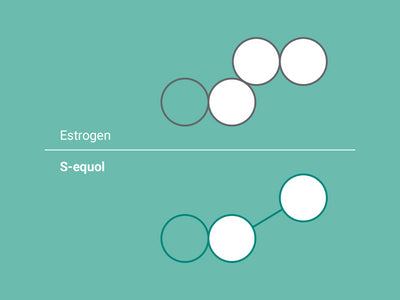
Clearing Up Brain Fog During Menopause
We’ve all done it before, and we’ll all do it again. We walk into a room only to stand there staring at the wall wondering what brought us there in the first place. While this can happen at any age, brain fog during menopause is especially common, and the easiest to joke about.
However, it’s not so funny as women say they experience everything from forgetfulness to difficulty concentrating. Over 8,400 women took our menopause survey and we found 66% of women reported experiencing forgetfulness as well.◊ Many of these symptoms are just a natural part of getting older. But because estrogen plays such a powerful role in the body (and the brain), it’s worth giving those memory missteps a second look to see if something bigger could be at play.
We’ve got estrogen on the brain, and so do you
Estrogen plays many important roles in the brain. It influences brain function directly by helping regulate cell signaling in the brain and indirectly through its actions on vascular blood flow and circulation.1 This powerful hormone is also involved in other neural activities related to cognitive function and even protects against cell death in some cases.1 Estrogen is associated with protective effects on the brain and loss of estrogen can contribute to brain metabolism deficits, thereby resulting in brain health issues during menopause.2
Despite known actions of estrogen on the brain, the full implications of estrogen loss after menopause and long-term brain health are still unclear.1 Emerging research shows low estrogen levels are associated with cognitive decline as well as increased levels of a specific brain protein involved in Alzheimer’s disease (AD).2 However, clinical findings using estrogen therapies and brain health conditions are mixed, suggesting more information on the various roles of estrogen in brain health pathways are needed.
Memory problems are still a concerning symptom during the menopause transition, however, because certain types of “brain fog” may be an early sign of larger health problems such as AD and other forms of dementia.1 Considering that women are nearly twice as likely to develop AD than men, we should be as proactive as possible about our brain health especially during and after menopause.3
Learn more about how estrogen affects your body
A few other things that could be cluttering your mental space
Our brain is linked to every other system in our body. If something’s off, our brain will feel it. This phase of life is introducing all kinds of new stressors that play into your overall mental state. Here are a few other symptoms that may also be contributing to your brain fog:
- Sleep loss can disrupt your brain’s ability to learn or make new memories4
- A lack of sleep can make it harder to concentrate and respond quickly4
- Some medications can bring on a change in memory as a side effect5
- Developing or existing health problems such as anxiety, depression, vitamin deficiencies, heart, and even thyroid diseases may contribute as well5
- Mood, physical health, and perceived stress may contribute to some memory symptoms1
There are many factors at play when it comes to brain health. Some symptoms are a normal part of aging while others may be the result of other health-related issues, and some could be cause for concern. Writing down your specific symptoms will help you track your health so if anything seems amiss, you will have tangible points to discuss later with your doctor.
Simple steps to help cut through the brain fog
Turns out, several of the most common body and heart health tips may also be helpful for your brain too. Look at it that way, one small change can have a positive impact on all kinds of things. Here are a few fun ways to start:
- Expand your horizons: Stimulate your brain with new experiences. Learn that language you’ve always wanted to speak, pick up dancing, or just try something new, that you haven’t done before. Recent studies show that creative activities may help improve your memory, comprehension, creativity, and even problem-solving skills.6
- Back off on the booze: This tip probably makes it onto every healthy living list, but it applies here as well. Alcohol affects everyone differently as they age. You may not be able to “handle your liquor” the way you used to, leaving you confused or more prone to accidents. Most recommendations define “moderate” drinking for women as one drink on any single given day.7
- Diversify your diet: A typical heart-healthy diet can also be good for your brain as well. This includes meals rich in fresh colorful vegetables and fruits, along with nuts, fish, and low-fat dairy products. Your sense of taste can also evolve over time, so if your go-to grub is boring you, maybe try some veggies you swore off years ago or expand your taste buds to try a new kind of whole grain.8
- Stay in touch with loved ones: Studies show that consistent contact with loved ones and regular social activities can help reduce some risks to brain health.9 Combine your new hobby with a few friends to tackle two brain health tips in one.
- Keep your medications in mind: Medication side effects can change over time and even affect cognitive function. Make sure your doctor is aware of everything you’re taking, even natural or over-the-counter products, to ensure a whole-body point of view when it comes to your brain health.10
- Bring back your balance: Regular balance and strength exercises can help reduce fall-related injuries that are linked to memory loss or impaired thinking. This is especially important for anyone who’s fallen already, as your chances of falling again actually double after the first fall. Medication can also affect balance, so be sure to check in with your doctor about those.11
- Sleep like you never have before: Sleep is important during every phase of life, but often the complexities of our lives prevent us from getting enough of it. There is no time like the present to change that. Poor sleep can affect memory and thought processes, plus cause depressive feelings and accident-prone behaviors.12
Read more about overcoming sleep loss during menopause
- Boil it up to blood pressure: High blood pressure can have serious effects on long-term brain health. As you age, your heart and brain can both change, which can result in high blood pressure. Often people won’t be able to tell something’s wrong for years, which is why it’s always a good idea to have regular checkups with your doctor to discuss all the changes that come with menopause and getting older in general.13
- Get that heart pumping: Get that heart pumping for 30 minutes every few days, even if it’s something as simple as a nightly walk or playing with the grandkids. If exercise is difficult for you, start small and ask your doctor if there are some activities you haven’t considered. Aerobic exercise is especially good, as it’s directly linked to improving both memory and thinking skills.14
- Talk to your doctor: We mention this all the time, but that’s because having regular honest conversations with a trusted practitioner is so important. No question is too small, no symptom too faint. Find somebody you trust and schedule a time to tend to your brain health.
Print out our 10 Questions To Ask Your Doctor for your next visit
Key signs that forgetfulness could be more than brain fog
There are some characteristics, however, which most clinicians and researchers agree are not normal signs of aging. Any memory problems that start to interfere with daily life activities may be cause for concern; specifically, those that might point toward Mild Cognitive Impairment (MCI). MCI is generally thought to be a point along the path to dementia for some people, although not all people with MCI develop dementia. People with MCI experience many of the following symptoms:5
- Frequently forgetting appointments or planned events
- Repeating the same questions and stories
- Forgetting the names of close friends or family
- Having difficulty understanding written or verbal information
- Struggling to complete complex tasks such as paying bills, taking medications, shopping, cooking, household cleaning, or driving
People with MCI may also experience anxiety, depression, irritability, aggression, and apathy.15
If you’re concerned your brain fog during menopause might be symptomatic of something else, keep track of your symptoms and schedule a time to chat with your doctor.
Brain fog may feel like just another natural part of getting older, and to some extent it is. But these memory problems could also be masking or contributing to other health conditions. Being a woman only further complicates this issue. For example, women may have an advantage over men when it comes to verbal memory later in life—but that advantage can mask the onset effects of Alzheimer’s Disease.16 While there is no simple answer to these complex issues, tending to our symptoms now could help mitigate some problems later. Whether you are years into menopause or just starting down this path, it’s never too late to start thinking about your brain health.
◊Equelle.com online survey of US women (n= 8,401) from Sept 2019 – Feb 2020
References
- Henderson, Victor. Cognitive Changes After Menopause: Influence of Estrogen. Clin Obstet Gynecol. 2008; 51(3): 618–626.
- Li, R. et al. Sex Differences in Cognitive Impairment and Alzheimer’s Disease. Front Neuroendocrinol. 2014; 35(3): 385–403.
- Alzheimer’s Association. 2019 Alzheimer’s disease facts and figures. Alzheimer’s & Dementia. 2019; 15(3): 321–387.
- National Institutes of Health. “Brain Basics: Understanding Sleep.” 2019. National Institute of Neurological Disorders and Stroke. Accessed on: February 10, 2020. <https://www.ninds.nih.gov/Disorders/Patient-Caregiver-Education/Understanding-sleep>
- Cleveland Clinic. “Memory Problems: What is Normal Aging and What Is Not.” 2019. Accessed on: February 10, 2020. <https://my.clevelandclinic.org/health/articles/11826-memory-problems-what-is-normal-aging-and-what-is-not?view=print
- What is Brain Health? “Discover a New Talent.” 2020. Accessed on: February 10, 2020. <https://brainhealth.nia.nih.gov/engage-your-brain/discover-a-new-talent>
- What is Brain Health? “Drink Moderately.” 2020. Accessed on: February 10, 2020. <https://brainhealth.nia.nih.gov/engage-your-brain/drink-moderately>
- What is Brain Health? “Eat Up.” 2020. Accessed on: February 10, 2020. <https://brainhealth.nia.nih.gov/engage-your-brain/eat-up>
- What is Brain Health? “Stay Connected.” 2020. Accessed on: February 10, 2020. <https://brainhealth.nia.nih.gov/engage-your-brain/stay-connected>
- What is Brain Health? “Mind Your Meds.” 2020. Accessed on: February 10, 2020. <https://brainhealth.nia.nih.gov/engage-your-brain/mind-your-meds>
- What is Brain Health? “Maintain Your Balance.” 2020. Accessed on: February 10, 2020. <https://brainhealth.nia.nih.gov/engage-your-brain/maintain-your-balance>
- What is Brain Health? “Get Some Shuteye.” 2020. Accessed on: February 10, 2020. <https://brainhealth.nia.nih.gov/engage-your-brain/get-some-shuteye>
- What is Brain Health? “Know Your Blood Pressure.” 2020. Accessed on: February 10, 2020. <https://brainhealth.nia.nih.gov/engage-your-brain/know-your-blood-pressure>
- The North American Menopause Society. “Sitting Can Sabotage Your Good Health Habits.” 2020. Accessed on: February 10, 2020. < https://www.menopause.org/for-women/menopauseflashes/exercise-and-diet/sitting-can-sabotage-your-good-health-habits>
- Mayo Clinic. “Mild cognitive impairment (MCI).” 2020. Mayo Foundation for Medical Education and Research (MFMER). Accessed on: February 10, 2020. <https://www.mayoclinic.org/diseases-conditions/mild-cognitive-impairment/symptoms-causes/syc-20354578>
- Jacobs, E. et al. The middle-aged brain: biological sex and sex hormones shape memory circuitry. Current Opinion in Behavioral Sciences. 2018; 23: 84–91.


